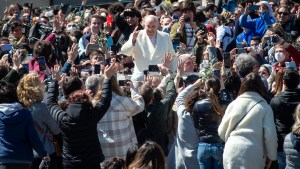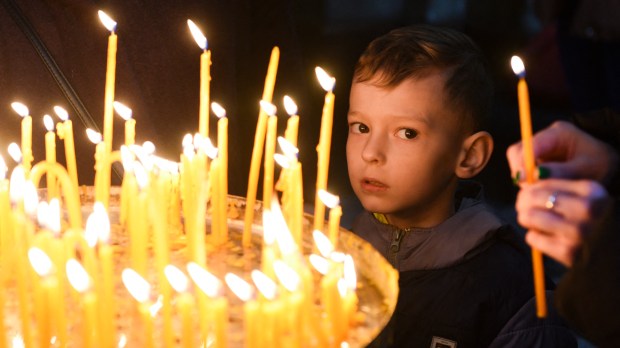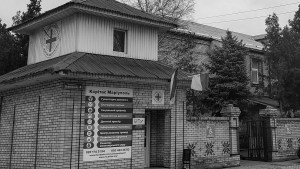As much as Ukraine is the object of humanitarian assistance right now, it is also a place where pastoral and spiritual accompaniment is vital, said representatives of a pontifical foundation working there.
With millions of people displaced from their homes in the midst of the Russian invasion, there is a massive amount of work on the part of humanitarian aid agencies supplying food, medicine and shelter, both in Ukraine and in neighboring countries of Eastern Europe, which have seen the largest flow of refugees since the Second World War. One of those agencies is Aid to the Church in Need, which has worked in Ukraine for many years, especially since the breakup of the Soviet Union in 1991. On Tuesday, a small delegation that has been in Ukraine in recent days shared their observations during a Zoom meeting of ACN offices around the world, to which journalists were invited. The three-person delegation spoke from the Western Ukrainian city of Lviv.
Immediately after the invasion began on February 24, ACN announced a package of 1.3 million euros for Latin Catholic dioceses and Greek Catholic eparchies and exarchates throughout Ukraine. These funds have already been distributed, and now, 687,180 euros has been approved for a second aid package, with a possible additional 202,500 euros to follow. In addition, ACN has approved 27 projects totalling 579,491 euros in Mass stipends for Ukrainian priests. Many of them are married Greek Catholic priests with families, so they are in extra need.
In general, the aid being provided is as pastoral as well as it is humanitarian, said Marco Mencaglia, Project Director of ACN for East Europe, during the Zoom meeting. He said that for many migrants, especially from Eastern Ukraine, seeing the humanitarian outreach from ACN and similar agencies has been their first experience of the Church. “They found spiritual assistance as well as food,” he said. He also said that some people asked to be baptized.
Dominican Sr. Karolina Mordaka of ACN Poland, who served for seven years as a missionary in Ukraine, has noticed many people praying and going to church services, even if they were non-believers before. “Nobody is forcing them to go to church,” she said. “They need the prayers. They need the spiritual support.”
Sr. Karolina said that people regularly approach her in public, as she is dressed in a black and white habit with a long rosary hanging from her belt, asking who she is and requesting prayer.
“One woman said she was baptized but didn’t know how to pray,” she said. “She was so grateful that people were teaching her how to pray.”
Many internally displaced persons are staying in seminaries, monasteries and other church buildings in Lviv and nearby Ivano-Frankivsk. In that city’s Greek-Catholic seminary, the 190 seminarians have been taking shifts to serve their displaced guests – mostly women and children.
The great majority of Catholic priests in Ukraine have remained in the country, Mencaglia attested, even if some of them had to shift from a city under bombardment to a safer area. A church that ACN supported in the besieged city of Mariupol was destroyed, as was more than 90% of buildings in the city center, he said.
Mass in a bunker
But bomb shelters – and in the capital, subway stations – have been places of prayer and even the celebration of liturgies. One bomb shelter the delegation visited in Hoshiv had a small, makeshift chapel in it.
ACN’s mission has long been to help ensure that the Church can continue serving the faithful even under the most difficult of circumstances, and Mencaglia spoke of providing Mass kits for priests to be able to celebrate the liturgy in nontraditional places, when such service in churches isn’t possible.
The delegation felt confident that Holy Week liturgies would proceed – this week for Latin Catholics, and next week for Greek Catholics, who follow the Julian calendar – as best as possible, depending on the particular situation of each area.
Sr. Karolina said that the delegation had a Zoom meeting yesterday with His Beatitude Sviatoslav Shevchuk, major archbishop of Kyiv-Halych of the Ukrainian Greek Catholic Church, who is based in Kyiv. He appreciates the proximity of agencies like ACN to Ukraine at this time and said it is very important that Ukrainians feel the closeness of the global Church. He also said that it would be better for people in other countries to send financial aid, rather than goods, so that the money could be put into Ukraine’s struggling economy.
Mencaglia said that besides the established aid agencies helping in Ukraine, they could see tons of goods – ranging from diapers to medical supplies – that had been collected on the parish level in the United States and other countries.
Traumatized population
In addition to spiritual support, there will be a need for psychological intervention in many cases, speakers said. “Some people couldn’t even speak about their experiences,” said Magda Kaczmarek, Project Manager ACN for Ukraine. “Children don’t understand what’s happening.”
Kaczmarek said that some of the people they met recently had come from the Eastern city of Kramatorsk, where a missile strike on the main train station killed more than 50 of the civilians waiting there for a train to take them out of the war zone. “You could see that they were traumatized,” Kaczmarek said, referring to their “glassy eyes” and distant looks.
“There will be a big job for psychologists to take care of these people,” she said.
Speakers also noted that Ukrainians have been united in the face of the war, in spite of religious and ethnic differences. No one who lives in Lviv and other places receiving IDPs, Sr. Karolina said, ask, “Who are you? Where do you come from?”
“They ask, ‘What do you need?’”
The meeting concluded with a renewed request for prayer for Ukraine. Said Sr. Carolina, “In every single place we went, people were asking for prayer.



